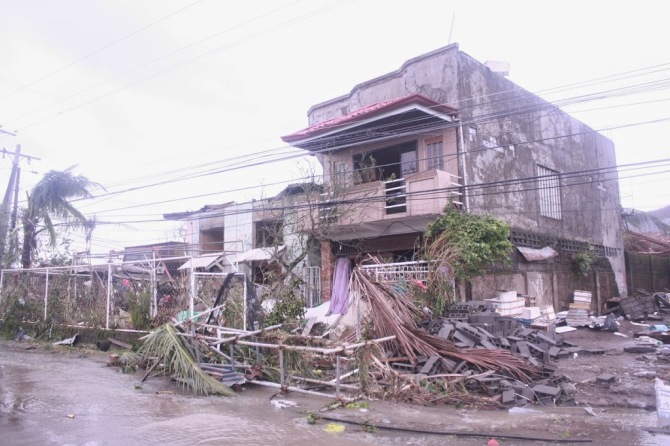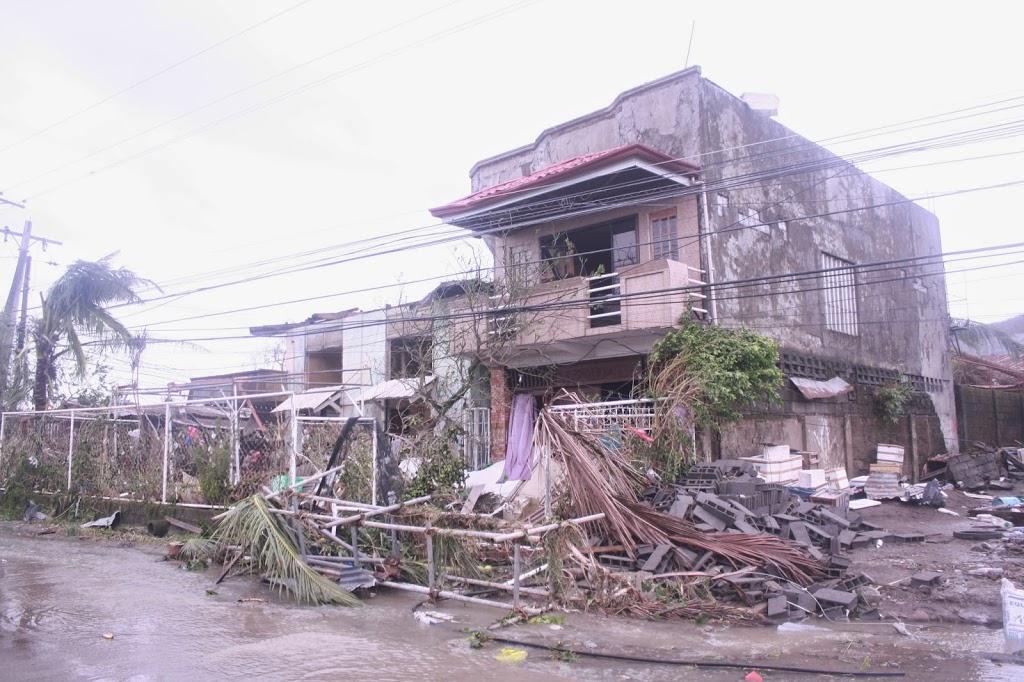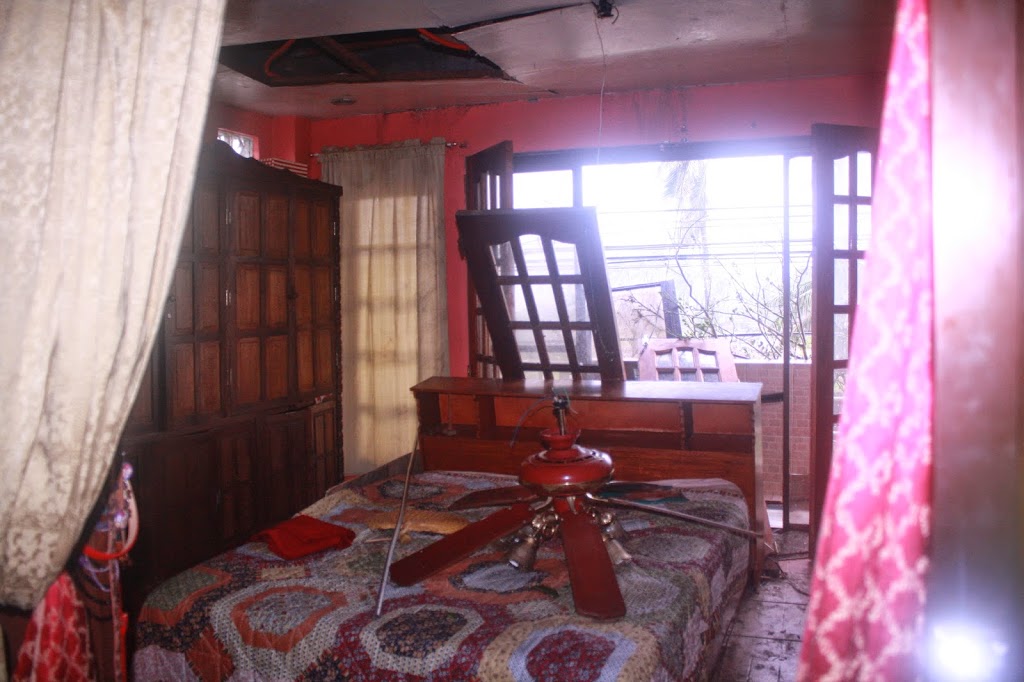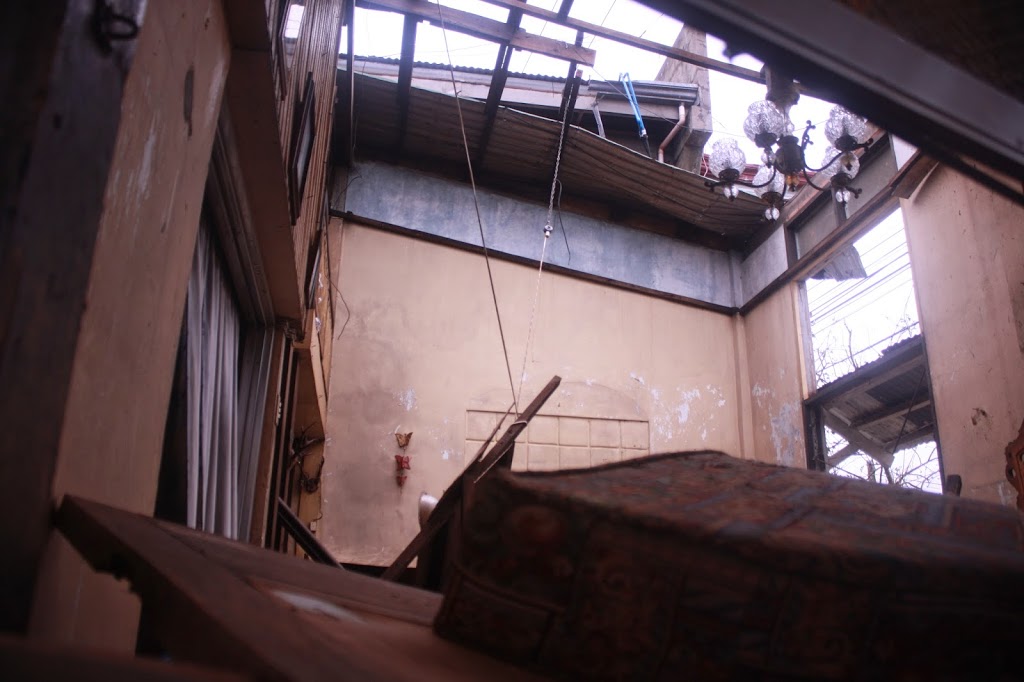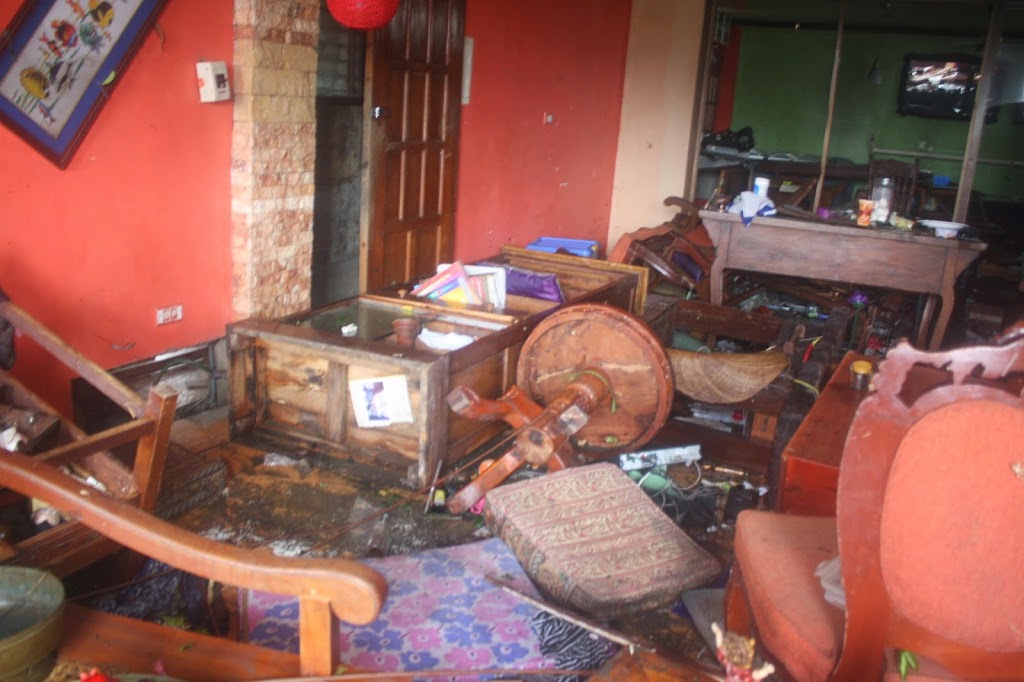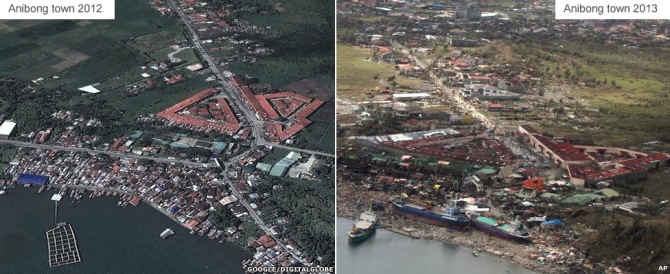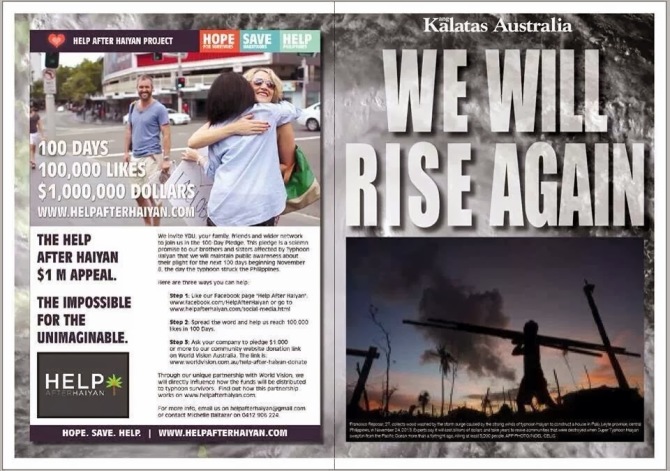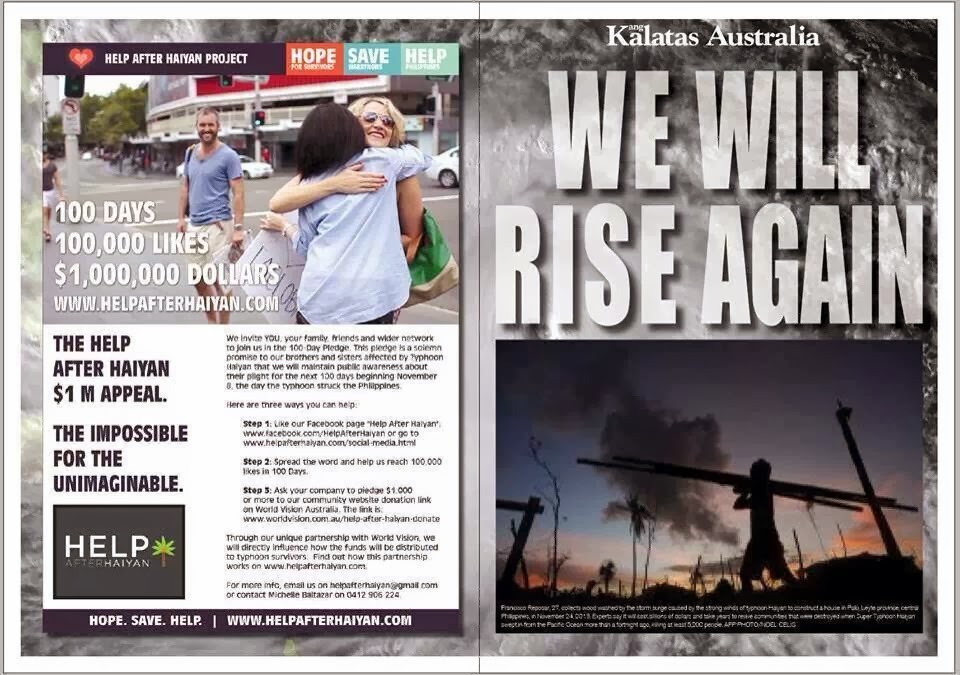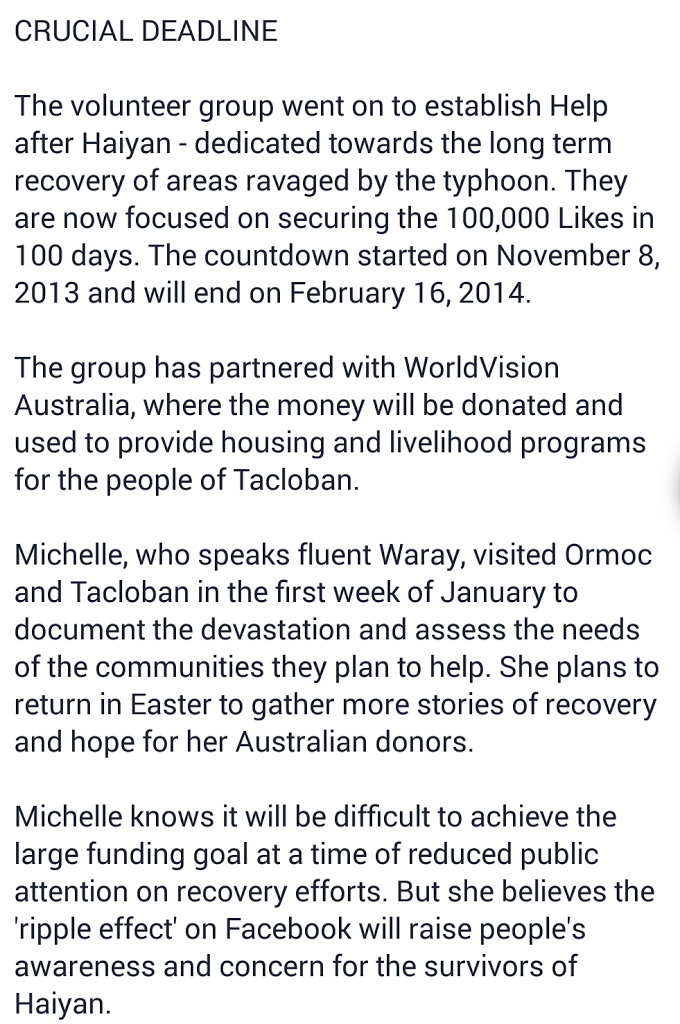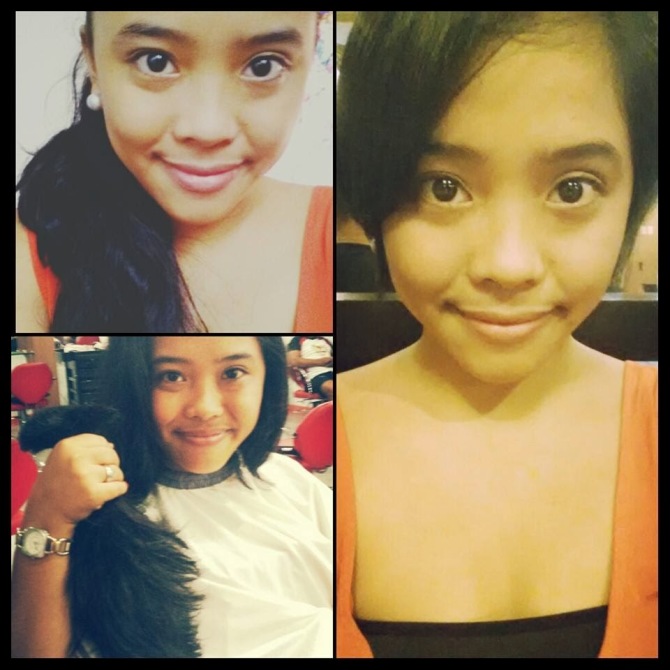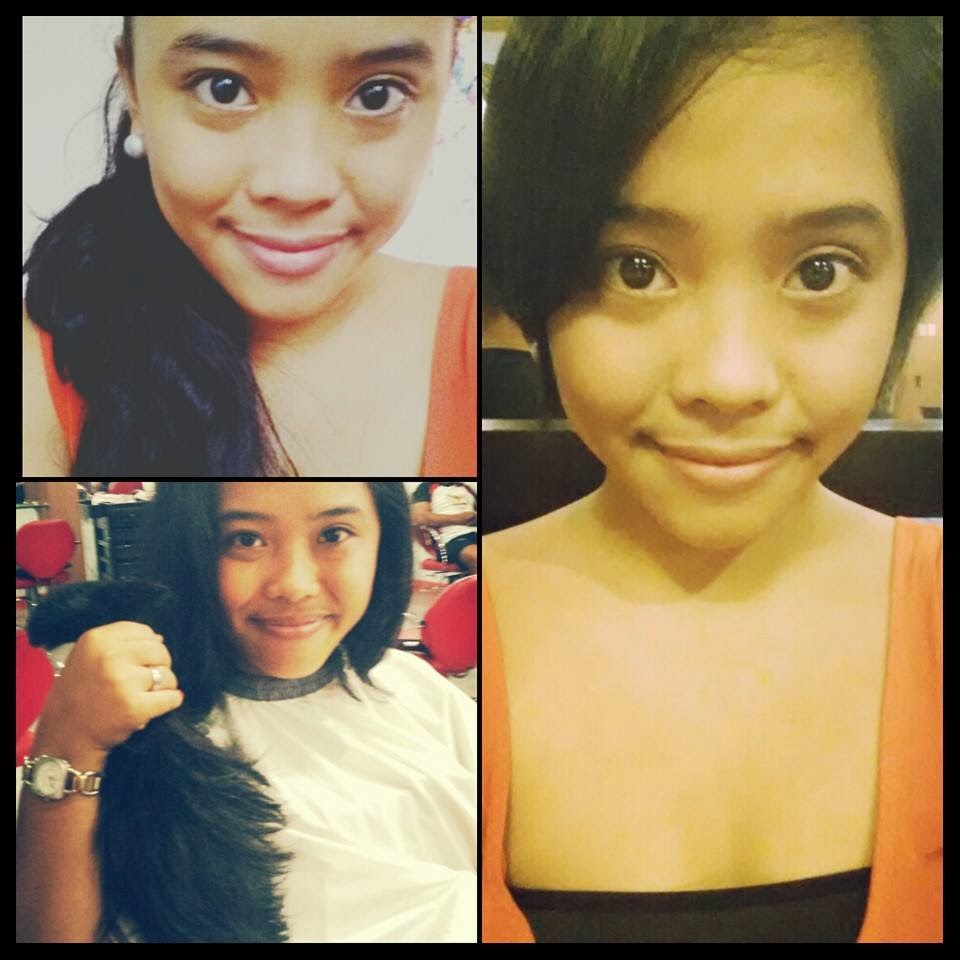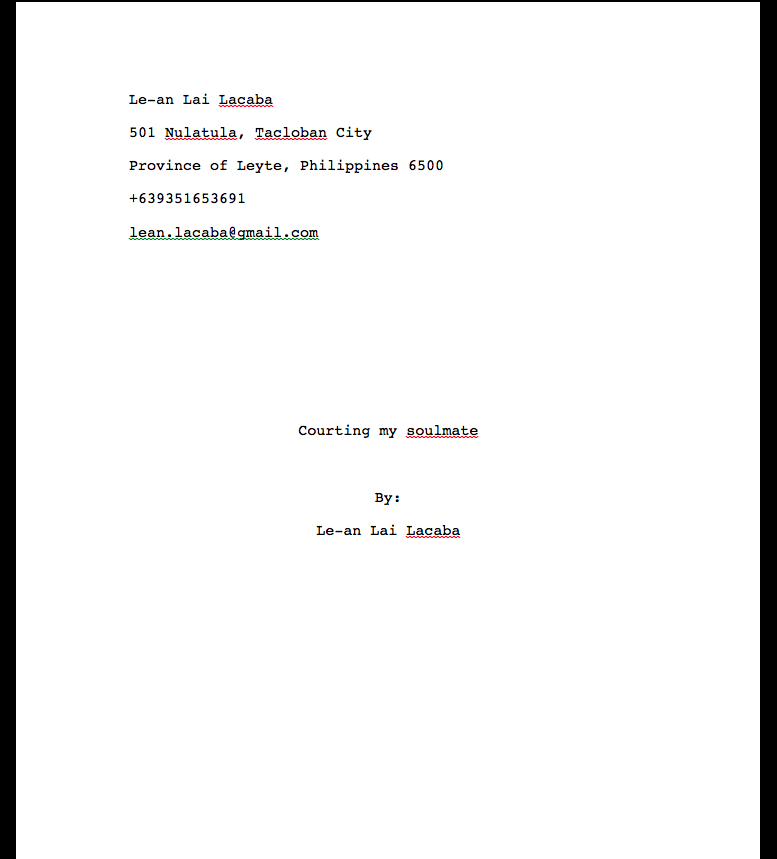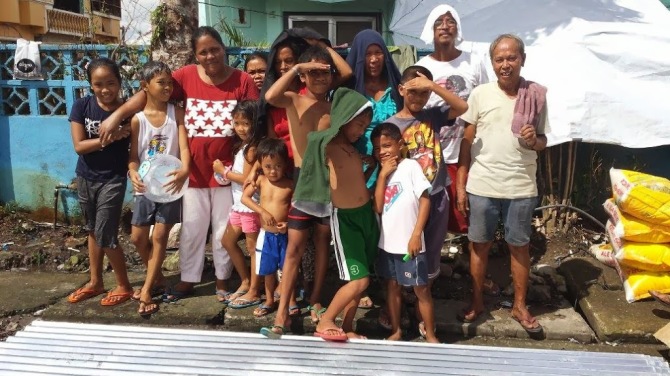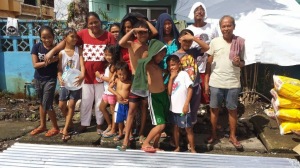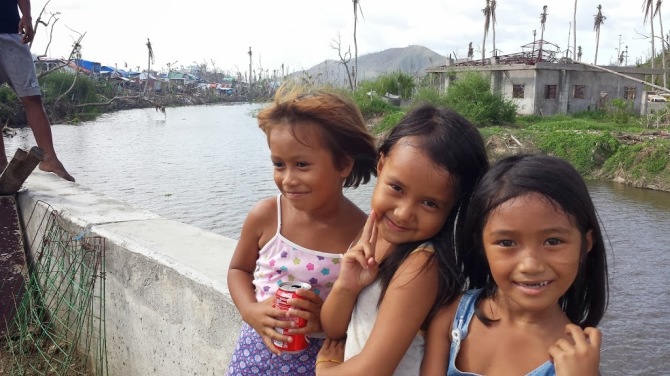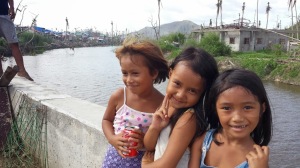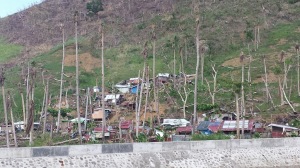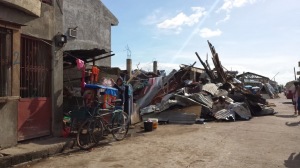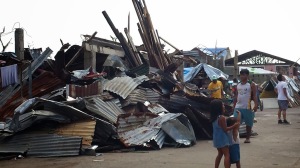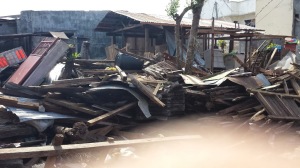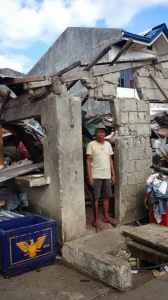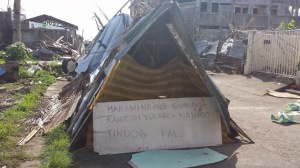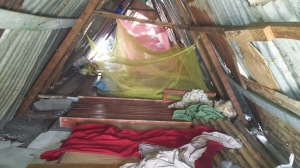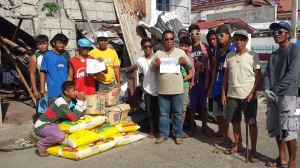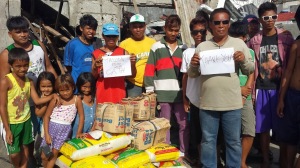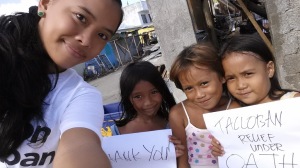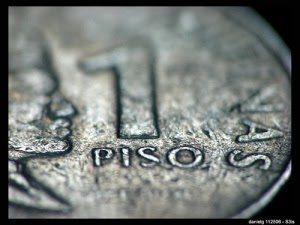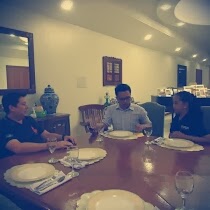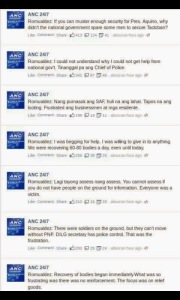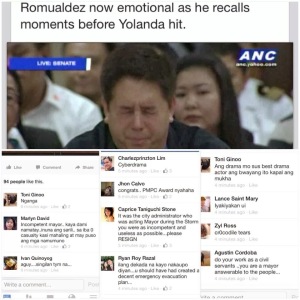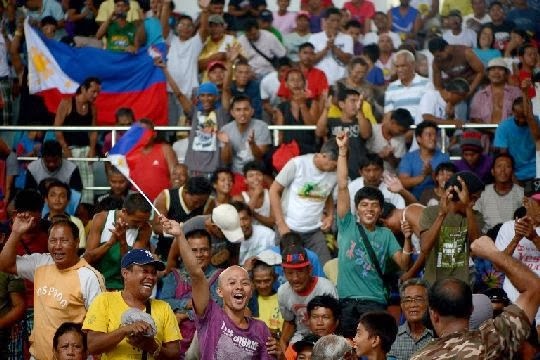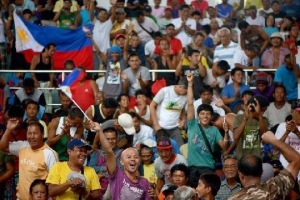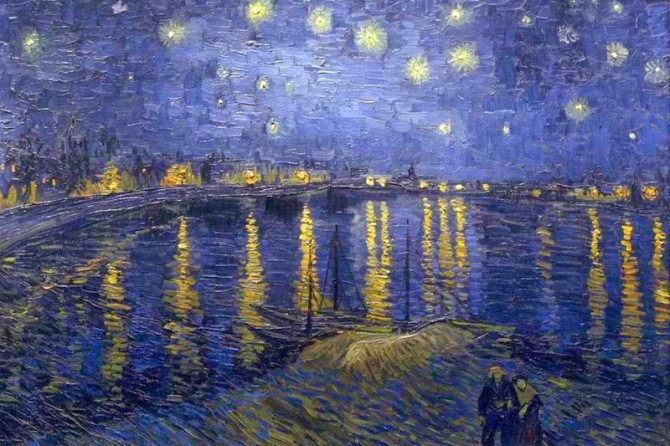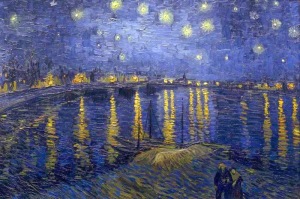Category: haiyan
Streetlight
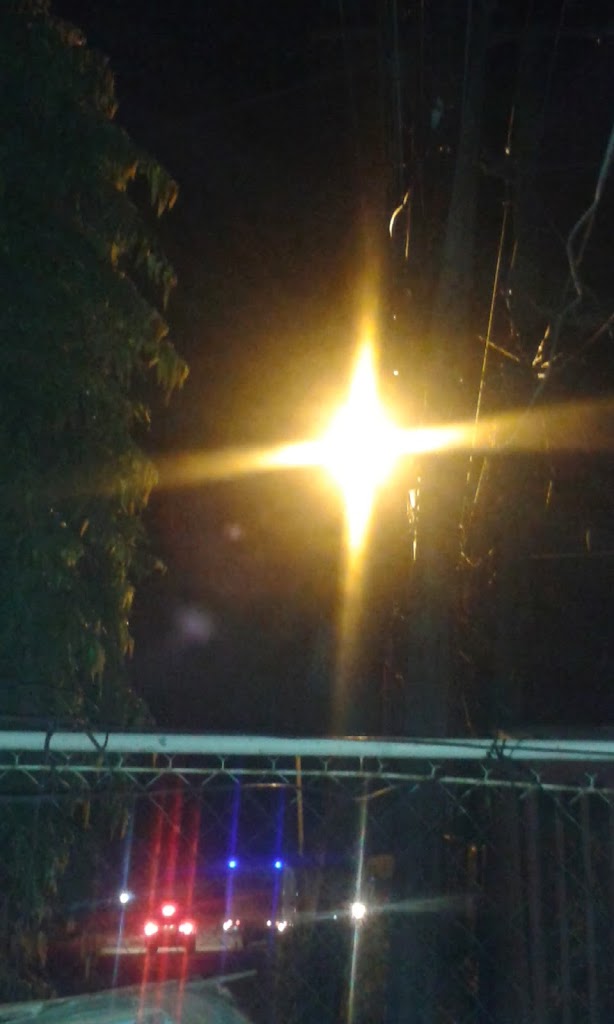 |
| After four months, it lights up our streets. And ultimately, our hearts. |
A Taclobanon’s week
I have immersed myself in Tacloban since we came home last Saturday. And here’s my daily routine since the super typhoon Haiyan/Yolanda sashayed into our lives.
SUNDAY
We wake up early, and try to cook and eat in the darkness. Since there is still no electricity and most of the malls have been slaughtered by the hands of man and nature, there are no more places to spend the “Family Day”. We spend it at home, as we make constant repairs to make our home at least look normal. Then we go to church, have dinner and hope to go home before dark. The streets are still unlit, making the usual driving a hassle as we try to avoid bumps on the road. When we reach home, we instantly feel sleepy, as there are no other ways to occupy ourselves. We fall asleep before eight.
MONDAY – FRIDAY
Since I have school, I wake up earlier than normal, and try to cook by flashlight. Once everyone is finished, I take a bath in very cold waters, since the weather has been very gloomy. Then the war for a jeepney begins. Since the storm, Tacloban has lost 50% of it’s public utility vehicles, making the daily commute close to impossible since a lot of us struggle for a ride. Once I do get on a jeep, there is that twenty minute ride, where we pass by Anibong, the village where five boats still stand over houses. When I reach school, after paying twenty pesos(from the normal 15) for my ride, there is the scene of destruction. And with the rain pouring hard, classes are postponed.
So when I don’t have classes, I go to the downtown area. And everywhere, I mean everywhere, you’d see the destruction. Broken windows, roofless buildings, pulverised cement and overturned vehicles. It is really a heartbreaking state, especially for someone used to seeing Tacloban in it’s full life. Now, it looks half dead. There are businesses open, yes, but some are overpriced, and there are a lot of scarce things. There are some streets that have been energised, but not all.
When you try to buy pork, fish or veggies in Tacloban, they’re not only expensive, but you also have to cook them that very day. Since there are no refrigerators (since there isn’t any electricity), you have to cook the food to preserve them.
For those sending packages, you have to wait at least 3 days before claiming them at the post office.
Hot food is a rare commodity, which explains why you have to fight for your favorite kind of bread.
Everything has a LINE. And not just any line, a very long line. To eat at a restaurant, there’s a line. To withdraw from a bank/ATM, there’s a line. To get your package, there’s a line. For relief goods, there’s a line. To get into a hospital, there’s a line. It just shows how abnormal everything is.
When I go home, which is before 4pm, I try to catch a jeep again. And when I do, it’s another ride through Anibong, to the places that were severed by the storm. And when I get home, I try to cook in the dark again, hoping that I wouldn’t cook the food rare or burnt.
SATURDAY
Since it’s the weekend, we all try to do our little own thing. For me, it’s trying to find a power source (since everything needs electricity these days) so I could write on my device. That means going to downtown again.
All this in one week, not to mention the non stop rains and the flooded roads.
The Taclobanons proved themselves to be survivors of this world record storm. If things are hard two months after the storm, what about the first few weeks? They had so little, and had to battle for the survival of their family members and themselves.
The world seems to slowly forget about the city that was once in full bloom, uprooted in three hours. I hope you don’t.
To read more about the Haiyan/Yolanda experience, click here: http://dimperfectprincess.blogspot.com/search/label/haiyan
Getting back to Tacloban
I’m back home.
It has been two months since Haiyan, and slowly Tacloban has begun to rise from its ruins. The news has died down, but the stories continue.
Sometimes I feel like I am in a foreign place, a place I need to rediscover. It is a heartbreaking reality, but it is something that I must face, and something the people of Tacloban have been facing for the past few months.
We went to Cebu a week after Haiyan to escape the horrors that seemed to haunt us in every corner of the typhoon ridden city. And now that we’re back for good since I have school this January 13, I feel like the horrors never really stopped. From the view of an eighteen year old girl who grew up in the city by the Cantabato Bay, it is a city bruised and left for dead, reviving itself.
And now I have decided to immerse myself into helping those who were not as lucky as I was. In the bible, I always remember that I was taught that if I wanted to give something to the poor, I should give with my left hand and never let my right hand know what I was doing. It meant that when I do something good, I shouldn’t tell others. But in this case, I need the help of the people who can donate and give what they could for the people of Tacloban.
I have already volunteered for a local charity in Tacloban, I still have rice runs for OATH, and now I will share with you Help after Haiyan.
This organization who added me to their group had a unique story all on their own. You can find their website here. http://www.helpafterhaiyan.com
Their goal is to reach 100,000 likes on their Facebook page by February. When every like can be worth 1Million, it’s worth it. So I’m sharing their page, with the hope that you will help them in this endeavor.
https://www.facebook.com/HelpAfterHaiyan
Read my experience of Haiyan here : http://dimperfectprincess.blogspot.com/2013/11/meeting-haiyan-first-hand-experience.html
You can read more at the “Haiyan Experience” tab on my blog.
Pixie cuts, courting soulmates and going home
Pixie cut and saving shampoos
So last Sunday I got a pixie cut. Almost the same one I got three years ago. And so, I have created pros and cons of having short hair.
Pros:
- You save on both shampoo and conditioner. I mean, you don’t have to put so much effort on cleaning your hair when it’s this short!
- It’s easy to style. You can just handcomb it and voila! You’re good to go.
- Less heat. This was my primary reason when I decided to get a cut. With my hair going below my breasts, it was getting hotter when I let it lose.
- You stand out. My professor once told me when I had my first pixie cut that it made me stand out.
- No more bed hair!
- Save on hair ties and scrunchies! The thing with long hair is that you have to have a scrunchie wherever you went in case of emergencies, ei, you had a bad hair day. Now I don’t have to, so there are less chances of losing them to my bottomless bag.
- Look fierce. No more explaination.
- Look younger. It really does take years off your face.
- You’ll be mistaken as a tomboy, or a boy. This is why I like wearing dresses and shorts. This isn’t really a problem for me, since I’m so girly at times that I gross myself out. I am a tomboy a bit, but not so much.
- People you know make fun of you. For example, my lovable brother, who has taken it upon himself to call me “bro”. Grr.
- Nothing follows.
Since my 1st book is still waiting for publishers to nibble it, I’m working on my second book, my first whole novel. I’ve never written anything like this. If you check my Wattpad account, you’d see that I haven’t finished any story. I’m the type who wants to write in one sitting. So a whole novel will be challenging, and I love my plot so far.
Let’s end this with a weird photo shall we? Like my blog’s FB page? Puhlease? https://www.facebook.com/dimperfectprincess
Giving hope through OATH
Send help through OATH’s bank account below:
Relief under OATH
Last weekend I went to Tacloban for a very special mission: I got the chance to help survivors of Haiyan like myself. As most of you know, my family and I have moved to Cebu for the meantime, just until classes start at Tacloban this January.
Thanks to social media, I got in contact with foreigners who had the kind heart to help the survivors, even when they did not know them. After days of canvasing and tying the knots, we finally got to go to Tacloban, almost a month after we left for Cebu. My parents, together with my brother and I traveled five hours by boat and two hours by car. It was completely devastating to see the sight, the fallen trees, roofless houses and the lot. I don’t want to divulge into any other details, because I will be posting some pictures below.
Anyway, it was simply heartbreaking when we reached the town that we were meant to be helping. Their houses were half or all gone, the mountain bare of leaves and destruction was everywhere. And yet, these girls found a reason to smile when I faced them the camera.
Now let us meet Mr. Arturo. He is a father of eight, and a grandfather of many. This is his house after the storm. It has no roof, no windows, and has collapsed.
Two sides of the coin
There are two sides to every coin.
When President Aquino stated that our Mayor was unprepared for Haiyan, that was his side of the story. He pointed fingers like a 5 year old child, his middle finger pointing to our beloved mayor. People rallied behind our childish president, and insulted our mayor too.
Let’s flip the coin.
If you’ve been reading my blog for a long time, then you’d know that my first interview as a writer was with the Mayor himself. To say I was in awe by his presence and his train of thought would be an understatement. He was a man with dreams of making Tacloban the best. He took what his predecessor left him and turned it into gold. Tacloban became a model of a great city, a place that boomed with such greatness than it was before. National malls and investors came in, with people moving to Tacloban in hope of a better future. When I was talking to him, he was a man with a purpose, a man with drive. Tacloban became a Highly Urbanized City under his reign.
He was on his final term when Haiyan struck. And it couldn’t have been more of a bad timing.
A week before Haiyan, the officers of Tacloban already began to make plans on how to cope with the storm. They planned out evacuation centers, relief goods and consulted with the mayor about preparedness. On the night before, people were evacuating to the places they were assigned to, complete with the needs of the people such as food and water. Everything was set.
Then all hell broke lose.
After the storm, rumors of the Mayor going around Tacloban in his motorcycle surfaced. His house was practically washed out, his family all in danger. He was a survivor of the storm, and I think a lot of people forgot about that fact.
He then went to his office, only to be faced with other officers and policemen who were still dazed after the storm. Some of them were missing, some were struggling to put a roof over their heads. When he was denied again and again by our president, he was frustrated. When the interior secretary, who is the right hand man of the president, told him to step down and let the national government take over, he said no. He didn’t see the need to step down because as far as he was concerned, the President of the Philippines was also the President of Tacloban. The national government could take over Tacloban without him resigning as Mayor.
And so it began.
The people of Tacloban struggled to eat, as the food from relief went to the provinces where the national government took over. It seemed that the President was leaving Tacloban to fend for itself, all because our Mayor was his political enemy. It was a struggle for Mayor Alfred, as he tried to lift Tacloban on his shoulders. He was either outside his office as he did what he could to save his citizens, or he was fighting demons in the form of out President and his right hand man. It was a feat that no leader had to go through, but he didn’t back out.
Today, there was a hearing to talk about the response to Haiyan. His statements were heartbreaking. Here are some of them: (Mar Roxas is the interior or DILG secretary)
And the reactions of those who were on the President’s side were insensitive. Just like the president. They reacted as if they were there during the storm. Just like the president.
If you can’t understand some of the comments, they’re criticizing the mayor as incompetent. As if they could do better.
So now, the two sides of the coin has been shown to the public and no the public is left to their own opinions. As for me, I stay by our Mayor’s side. I was in Tacloban 8 days after the storm. I can justify to what our Mayor has poured out, as my family and I did not receive any help from the national government the whole time that we were there. If the President really wanted to help, then it would have been felt by our family who struggled everyday to find food for us.
Which side of the coin are you part of?
——————-
To those who want to read about the Mayor’s typhoon experience: http://www.abs-cbnnews.com/focus/12/09/13/ghost-tacloban-weeps-recalls-typhoon-horror
Redefining “Victim”
The word victim, according to the Merriam-Webster dictionary, is someone or something that was harmed by an unpleasant event. For us Haiyan survivors, we are not only victims of a natural disaster, but we are also victims of our government.
But nevertheless, we don’t act like we are.
Right after the storm, we, the Taclobanons, did not have time to mourn for what we lost. We began to pick up the pieces, whether those pieces were broken furniture, mud covered clothes or frozen bodies. A few hours after the storm, you’d see people walking down the streets, checking on neighbors , friends and even to those they did not know. We just survived a record breaking storm, yet it didn’t break our spirit.
Because our roads were blocked with debris and our airports were damaged, the relief goods came slow. And with our President being hesitant to help our city because we were “unprepared” for a world record storm, help came slower.
As the days passed by, all eyes were on us. Choppers with cameras began circling our island, with famous TV logos on the side. The world was getting to know our little region, which was once just a dot on the map. Every move was recorded, our stories flashed onto TV. And when citizens began to breaking into grocery stores and malls, scouring for goods and necessities, our President called them “thieves”, and his right hand man asked us what we “needed”, as if he didn’t know what to do during a crisis. As we struggled to survive, our own government judged us and looked at us like we were rats.
And when the smell of the dead began to pollute the air, it was more dreadful. People fled from their houses to find shelter in evacuation centers and homes of friends and relatives. Houses became empty and unguarded. Everything left to the hope that there was something to return to.
Prisoners who escaped during the storm caused anxiety for many, as murderers and convicted criminals walked along the streets with us, their identity unknown. A few days later some of them would do an open fire in a village in the middle of the day, causing people to flee and even leave their vehicles on the side of the road as they stumbled to stay alive.
Soon we would learn that in this calamity, we were all equal. No one was rich, no one was poor. We were all on ground zero. Big houses were easily flicked by the storm surges, along with the small houses of people who were less privileged. Even our own politicians were victims, struggling to make each day count as they served the people who like them, lost something.
And to our Mayor who was on his third and final term, he lost almost everything he worked for the time he was in office.
But the problems were just beginning. We were short on medical help because the doctors and nurses were victims themselves. Our policemen were either missing or struggling to put a roof over their heads. Our schools were used as evacuation centers, some buildings lucky enough to not have at least one dead body inside. Our leaders were victims too, some unable to carry on with their duty as they coped with what happened.
But survive we shall.
Soon international aid came flying through our skies, bringing promise and hope. But when our government finally stepped in, they made these aids do a detour. Though planes after planes came everyday, my family and I never received even a small can of sardines from them. Rumors of these goods said that they were sent to the town next to us, whose former Congressman was apparently close with the President. But Taclobanons stood strong, through the hunger and the loss.
Most survivors fled to the main cities, boarding army planes or traveling by land. Some, travelled by foot. There was nothing left, they would say. And in truth, there really was nothing left. As one famous local reporter said right after the storm: “Tacloban is now a wasteland.”
A few days later there was talk of Martial Law, where the military and the President would take over our city. Police cars and army trucks from all over the country began to fill our streets. Soon a curfew was implemented. No one was allowed to roam the streets after eight in the evening, but the streets were open at five in the morning. And just when we thought that we were safe, rumors of multiple break-ins, murders and rape began to surface. I remember waking up to policemen firing their guns at a suspect, as they ran through our street. Restless nights began to take over the people, as they stood watch for their houses and of their neighbors. It was like a neighborhood nightwatch, with the people helping each other in the time of need. It was dead silent at night, as people anticipated of what was to come.
For those who seeked refuge in other cities, some were shunned when they asked for help by government centers. They struggled to adjust and find a place to live. Some found a home in a relative’s house, but some unlucky ones did not. It was a second life for all of us and most of us were starting from scratch.
The dead were collected and buried, but thousands of them are still undiscovered and some were buried into people’s backyards. Our government told everyone that only thousands have died, when it should be ten thousands. Lies were told to “calm” people down, when it really angered us, questioning the competence of our politicians.
Through Haiyan, we have learned about the people we’ve elected, and those who should have been elected. We have learned to not depend on the government, and grew a bond with other survivors. Haiyan showed us that though we are from different walks of life, we all have lost something, connecting us in some sort of way. The storm that was supposed to break our hearts, strengthened us with a new found hope that tomorrow was another day.
And now, a month later, we still struggle. Though help is slow and the government betraying us and showing their true colors, we stay firm. Though the sound of gunshots still echo through our streets, we are brave. Though food and drinking water is scarce, we do what we can to keep our family upfloat. Stores are slowly opening, oil companies are sending their trucks, and people are making the best of what is given. People from different parts of the country have settled here, to help with what they could. There is always a rainbow after the rain, a beam of hope that beats through every Filipino’s heart.
Though we are victims, we never act as defined. We are survivors, struggling to stand even though our legs are weak. We have redefined what being a “victim” is. We may be weak, we may have been battered with the calamity, we may be hungry for the truth, our hope for the future is unshaken. We are survivors, and though what it left is barely enough, we find strength to make it through.
———————————
Since I can’t seem to find a newspaper to publish this (I’ve submitted this to four publications) since it bluntly says the truth of what happened, I have shared it here. I hope you share this, since the media has already told enough fiction and I think the world deserves the truth.
Appreciating Silence
The clatter of spoon and fork resounded through the candlelit room; the utensils fighting to get hold of the viand. Soft exchanges were made, as mouth delighting food entered the sources of the voices. The light played on the faces of my family and relatives, with most of them had happy faces on despite of what we went through. When I stood up from the table, the heaviness of what I have indulged settled in my stomach, and I was thankful for the blessing.
I opened the front door, the cool breeze entering the house. The moonlight bounced on the dark streets, as cars zoomed past us and their lights illuminating the road they covered. I dragged a chair outside, as the others began to join in. This was an unspoken schedule with all of us, that we would go onto the porch after dinner.
The soft sound of my sister’s ukulele began to fill the silence, as we began to join in the singing. The houses in front of us were either missing a window or a roof, while a little blaze filled their rooms. The stars above us painted a Van Gough like scenery, as they twinkled and danced for us. It has been a long time since I’ve seen stars like these, without all the artificial light.
Soon there would be a moment of silence. We don’t really plan it. It’s just one of those things that just happen. In between the exchange of stories about the city and the typhoon, there is a moment of silence. With our departure from our beloved city just a day away, there was a sense of nostalgia. We all knew that nothing in Tacloban would be the same again when we come back.
When the only sound of crickets playing their tune surrounded us, we were all quiet. Curfew was not for another 10 minutes, so we stayed silent. We remember the home we left behind, as we sought shelter in a relative’s home. We think about what was ahead, a temporary life in another island.
In the midst of our silence, a star decides to graze the sky, leaving behind a trail of light. We are all left in awe, a wish beating inside of us. As eight in the evening strolled around, we decided to retire to our beds. And as I closed that door, I gazed at the sky for a moment. It was amazing how it was the sky that took away almost everything, yet it gave us hope that wishes can still come true. When I fell asleep that night, the darkness and deafening silence my only companion, I begin to appreciate the silence, the simplicity it can offer. And even in silence, a lot can be said. With the silence of that star who died in front of us gave us life, a beam of hope to move on.
———–
This was during the sixth day after Haiyan, the day we booked a flight to leave on the eighth day. There was no electricity (until now), and we only had music to entertain us. The shooting star seemed symbolic, and it looked so near to us. The wonders of nature.
